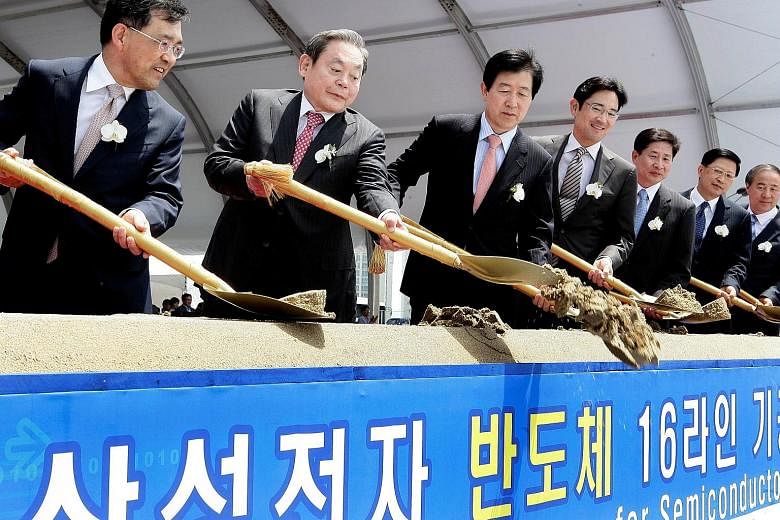The tycoon who became South Korea's richest man after transforming Samsung into a global tech titan best known for its smartphones, memory chips and LED televisions has died at the age of 78.
Mr Lee Kun-hee, who had been hospitalised since suffering a heart attack in 2014, died surrounded by his family, including his only son, company vice-chairman Lee Jae-yong, Samsung Electronics announced yesterday.
Condolences poured in from key politicians, while business leaders attended his wake at Samsung Medical Centre in Gangnam.
South Korean President Moon Jae-in paid tribute to Mr Lee for growing Samsung into a global brand with his "innovative leadership" and making it a key driver of the country's economic growth.
Mr Lee, the third son of Samsung founder Lee Byung-chul, was widely considered one of the most important architects of South Korea's post-war economic boom.
Under him, Samsung grew from a small trading firm to be the world's largest manufacturer of smartphones and memory chips. With dozens of affiliates ranging from construction and hotel to insurance and fashion, the group contributes about 20 per cent of South Korea's annual gross domestic product - the largest share by any chaebol, or family-owned conglomerate.
Mr Lee was the country's richest and most powerful businessman with a net worth of US$20 billion (S$27 billion), according to Forbes.
Born in Daegu, Mr Lee joined the family business in 1968 after studying business at Japan's Waseda University and George Washington University in the United States.
He took control of Samsung at the age of 45 in 1987 after his father died. Samsung described him as a "true visionary" whose trademark "New Management" philosophy announced in 1993 was the "motivating driver of the company's vision to deliver the best technology to help advance global society".
At a time when Samsung was producing cheap, low-quality products for mass export, he decided it was time to "change everything except your wife and children".
To drive home the message that Samsung would no longer tolerate poor quality, he ordered 150,000 defective phones to be burned and bulldozed in 1995 in front of around 2,000 weeping employees.
That paved the way for Samsung's hugely popular Anycall mobile phone model and marked the start of its rise to a global company. That corporate transformation will be remembered as Mr Lee's biggest legacy, said Professor Chang Sea-jin of the National University of Singapore, who wrote the book Sony Vs Samsung: The Inside Story Of The Electronics Giants' Battle For Global Supremacy.
"No one could understand Mr Lee Kun-hee back then, when everyone was trying to sell in big volumes to increase revenue," Prof Chang told The Straits Times. "But he changed the focus from quantity to quality, from poor exports to branded products. He is responsible for the Samsung that it is today."
Though known to be an inspirational leader, Mr Lee was reclusive and rarely gave interviews.
He had his fair share of scandals. In 1996, he was convicted of bribing former president Roh Tae-woo in return for business favours, while in 2008 he was found guilty of embezzlement and tax evasion in a slush fund scandal and forced to step down as chairman.
He got suspended sentences in both cases, and was eventually pardoned by sitting presidents.
Mr Lee was reinstated as chairman of Samsung Electronics in 2010 but suffered a heart attack in 2014 that kept him in hospital.
His son Jae-yong, groomed to take over from him, has been Samsung's de facto leader since.
Experts say the succession may face challenges as the younger Mr Lee is facing trial for unfair trading, stock manipulation and breach of trust in relation to a 2015 merger of two Samsung affiliates in order to consolidate his control.
He had already been jailed in 2017 over a graft case tied to impeached former president Park Geun-hye.
The 51-year-old will also have to decide whether to inherit his father's stock assets worth about 18 trillion won (S$21.6 billion), including a 4.18 per cent stake in Samsung Electronics. If so, he would have to pay 10 trillion won in inheritance tax.
Prof Chang said: "Lee Kun-hee was a very charismatic leader and people followed his orders. Lee Jae-yong doesn't have that kind of charisma, and the indictment and corruption cases make him look like a very weak leader.
"Samsung is still very much a top-down, bureaucratic company, so whether he can take control of Samsung is a big challenge."
Mr Lee is also survived by his wife and two daughters, who run Samsung's hotel business and welfare foundation. His funeral on Wednesday will be a private family affair.
Samsung said in a statement: "All of us... will cherish his memory and are grateful for the journey we shared with him.
"His legacy will be everlasting."

